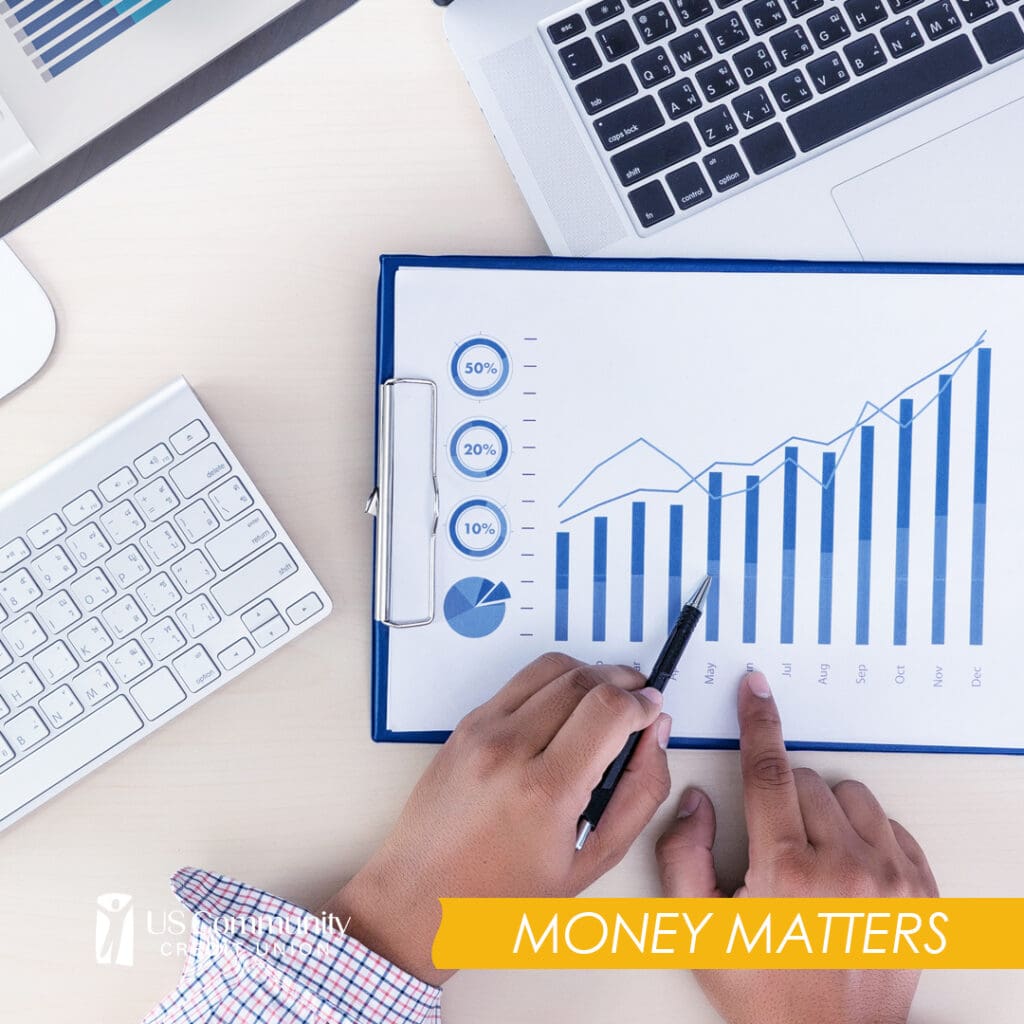
If you have accumulated more than $1,000 in savings, keep reading. Chances are, you know you should save your money, but don’t know where to put it. There are tons of saving options, too, that range from low risk to high risk investments.
What does it mean to invest your money into a money market or high yield savings account?
Don’t let the name intimidate you. Simply put, a money market account is a deposit account that pays YOU interest. Essentially, once your money is invested in this account, you continue to earn additional money, and the amount you earn is based on two factors:
- The interest rate set forth by your financial institution. (At US Community Credit Union, our philosophy is simple regarding interest rates: the more money you save, the better interest rate you receive.)
- The amount of money you invest into your money market account.
Why is a money market account better than a savings account?
A money market account is often viewed as a hybrid between standard savings and checking accounts. You place your money in the money market account with the goal of saving, just like you would with a savings account, but there are higher interest rates attached to it for greater savings potential. Similarly to your checking account, you are granted access to the money in your money market account, should you choose to tap into it.
A money market account becomes a great option for anyone interested in finding an interest-bearing savings account with the bonus of accessibility.
Is a money market account only used for long-term savings?
The short answer is “NO.” A money market account is a great tool for meeting both long-term and short-term savings goals. The higher interest rates and quarterly monetary returns open the door for increased earning potential. If you set a specific amount of money aside in your money market account, you can let it accrue higher rates of interest. But, be sure to set up additional deposits to that account each month – the more you save, the more interest you earn.
Savings and accessibility are at the heart of a money market account. Whether saving for something in particular or just saving to grow that security blanket, a money market is a great way to see your goal through.
Is a money market account safe and secure?
A money market account provides you with a sophisticated method for investing your hard-earned money, but in a safe and secure manner. This account takes the worry out of the investment because it is not impacted by market fluctuations. This means your account and the funds held within it will not lose value. And, your funds are invested up to $250,000 through the NCUA, granting you peace of mind to invest with confidence.
What kind of rates can I expect with a money market account?
All financial institutions have different criteria they evaluate to determine what rates will be offered to the public for money market accounts. Regardless of the criteria, the goal is to stay competitive with market rates and attract interest.
Find current US Community Credit Union rates HERE.
Are there monthly fees and maintenance fees associated with a money market account?
It is important to note that most money market accounts do have a minimum balance requirement, typically $1,000 or more. If you don’t meet that requirement or your account dips below, you could get hit with penalties or account maintenance fees.
Are there withdrawal or transaction limits?
Access to funds in a money market is one of the factors that set it apart from a traditional savings account. A typical money market allows you 6 transactions out of your money market account each month. Transactions are classified as your standard transaction and check writing. It is great to have access to an account that is earning such high rates of interest. But, be careful with that easy access, and be mindful of your account balance to prevent it from falling below any required minimum balances.
Is my money accessible should I need it?
Investing your money in a money market account keeps your finances liquid. Your investment can quickly and easily be converted into cash without losing an ounce of value. As mentioned above, there are typically minimum balance requirements for money market accounts, but the higher interest rates grant you that better return.
What should I be looking for when researching money market accounts?
The benefits of your money market account hinge on the interest rates you can obtain as it relates to the amount of money you plan to invest. Therefore, it’s important to research rates and account requirements before taking the plunge. Be sure to consider the following:
- Minimum balance requirement
- Check writing limitations
- Transaction limitations
- Account maintenance, transaction, and service fees
What is the difference between a certificate and a money market account?
The most significant difference between a certificate and money market account is liquidity. With a money market account, your money is accessible, though limited. A certificate, on the other hand, ties your money up for a set period of time while you continue to earn interest.
Also notable, you can (and should) continue to add money to a money market account. Once you place your funds in a certificate, however, you cannot add or subtract from it until the term limit is up.
In doing your research, take note of financial institutions that offer introductory rates or money market specials to help get you started. Talk to a US Community Credit Union representative to learn more about our money market specials and benefits!